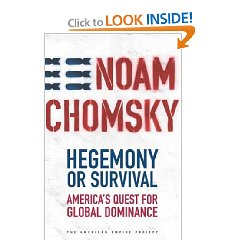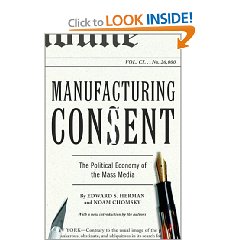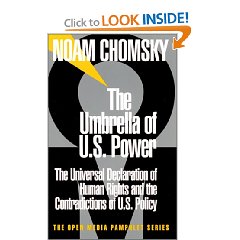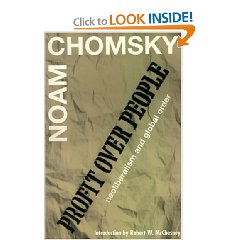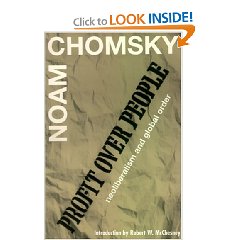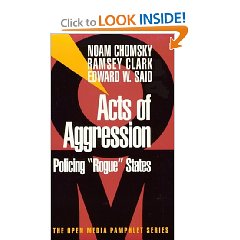Edit of 21 Dec 07 to restate importance of this work and add links.
UPDATED to comment on Hugo Chavez at UN.
Hugo Chavez and his Iranian counterpart, together with the leaders of Brazil, China, India, and Indonesia, among others, brought reality to America with the United Nations presentations. It is noteworthy that not a single member of the General Assembly disagreed with their harsh assessments of the Bush-Cheney regime. I reviewed this book before it was made popular by Chavez, and I will say just two things: 1) order it now, it is worth the wait; and 2) Bush-Cheney may not be interested in reality, but reality is assuredly interested in us. It's time the public realized that Chomsky, not Bush, is the real deal.
Yes, Chomsky tends to be repetitive and to rehash old stuff, so take away one-star. However, and I say this as the #1 Amazon reviewer of non-fiction about national security, to suggest that Chomsky is ever anything less than four stars is to betray one's ignorance and bias. He adds new material in this book, and perhaps even more importantly, he delivers this book at a time when America is faced with what may well be its sixth most important turning point in history (after independence, the civil war, two world wars, and the cold war). How America behaves in the 2004 election is going to determine whether the Republic deteriorates into a quasi-totalitarian and bunkered society with a lost middle class and a gated elite, or whether we restore the world's faith in American goodness, moral capitalism, and inclusive democracy.
Chomsky brilliantly brings forth a theme first articulated in recent times by Jonathan Schell (The Unconquerable World: Power, Nonviolence, and the Will of the People) by pointing out that the *only* “superpower” capable of containing the neo-conservative, neo-totalitarian, neo-Nazi militarism and unilateralism of the current Bush Administration is “the planet's public.”
Chomsky updates his work with both excellent and well-balanced footnotes and an orderly itemization of the arrogance, militarism, contempt for international law, arbitrary aggression, and–Bible thumpers take note–proven track record for supporting dictators, Israeli genocide against Palestinians, and US troop participation in–directly as well as indirectly–what will inevitably be judged by history to be a continuing pattern of war crimes.
Chomsky, past master of the topic of “manufacturing consent” now turns his attention to the manner in which the Bush Administration is attempting to establish “new norms” that, if permitted to stand, will reverse 50 years of human progress in seeking the legitimization of governance, respect for human rights, and collective decision-making and security.
He is especially strong on documenting the manner in which US aid grows in direct relation to the degree to which the recipient country is guilty of genocidal atrocities, with Colombia and Turkey being prime examples. The case can be made, and Chomsky makes it, that the US arms industry, and US policies on the selling and granting of arms world-wide, are in fact a direct US commitment to repression, genocide, and terrorism sponsored by one big state: the US. He is most interesting when he discusses the new US approach to repression, the privatization of actions against the underclasses of the world.
Morality plays big with Chomsky, who brings new ideas in with his discussion of moral asymmetry and the lack of moral integrity in US decision-making. Sadly, the US public is too busy trying to survive the abuses of the Bush-Cheney regime, and do not realize the crass immorality of all that is being done “in their name.”
Chomsky reminds us that George Bush the Second pardoned a known international terrorist, Luis Posada Carriles, because of his ties to the extremist Cuban-American community that his brother Jeb Bush is so dependent upon for support.
Over the course of the middle of the book Chomsky addresses the competing models for national development, with Cuba prominent as an alternative model that the US has sought to destroy, as the US worked very hard to destroy Catholic “liberation theology” because of its temerity in believing that the poor should be protected against repressive governments and their American corporate paymasters. Chomsky is correct, I believe, when he states and documents that the US model of capitalism has pathologically high rates of inequality and poverty (even CNN has noticed–as I waited for an airplane in Salt Lake City, a bastion of common sense, the lead story was the collapse of the US middle class).
Chomsky moves from his discussion of exceptions to US capitalism to a discussion of the importance of regional differentiation, and this is of course in direct competition with the US view that the world should be a homogenized generic variation of the US culture, with one big difference: 80% of the benefits for the US, while the rest of the world shares the left-overs.
Chomsky agrees with Dr. Col Max Manwaring and other mainstream strategists (see my review of The Search for Security: A U.S. Grand Strategy for the Twenty-First Century when he identifies the legitimacy of governments, and the sanctity of human and civil rights, as the two litmus tests for determining if balance and fairness exist in a society. By this measure, the US is now failing.
The book begins to conclude with a semantic discussion of terrorism, what is terror, who sponsors terror, and here Chomsky draws on both his linguistic and historical background to make the case that the US is the primary sponsor of terrorism in the world (something both the Indonesian and Malaysian leadership would tend to agree with), and he notes that the US, in a bi-partisan manner among the elite, has consistently been hypocritical about terrorism. Nelson Mandela, and his resistance party, were labeled terrorists by the US for many years.
Are we in a passing nightmare, or the beginning of a renaissance? The jury is still out. I personally believe that John McCain would have been a vastly superior president that this lightweight bully that we have now, with his out-of-control neo-conservatives, none of whom ever served in uniform and some of whom–as with Dick Cheney–were active draft dodgers. However, I also believe that both John McCain, and Dick Gephardt if he were to be elected, are too close to the “business as usual” crowd of beltway politicians capitalized by beltway bandits. In other words, Howard Dean would not have been possible without the excesses of George Bush Junior. God does indeed work in mysterious ways, and I pray that the American public will both read Chomsky, and understand that they represent the only super-power that can restore legitimacy, sanity, comity, and prosperity to the American Republic. Down with the carpetbaggers–El Pueblo Avansa–EPA!.
Recent books supporting the moral intelligence of Noam Chomsky:
Vice: Dick Cheney and the Hijacking of the American Presidency
Blood Money: Wasted Billions, Lost Lives, and Corporate Greed in Iraq
American Fascists: The Christian Right and the War On America
American Theocracy: The Peril and Politics of Radical Religion, Oil, and Borrowed Money in the 21stCentury
The Sorrows of Empire: Militarism, Secrecy, and the End of the Republic (The American Empire Project)
Fiasco: The American Military Adventure in Iraq
Independents Day: Awakening the American Spirit
Day of Reckoning: How Hubris, Ideology, and Greed Are Tearing America Apart



